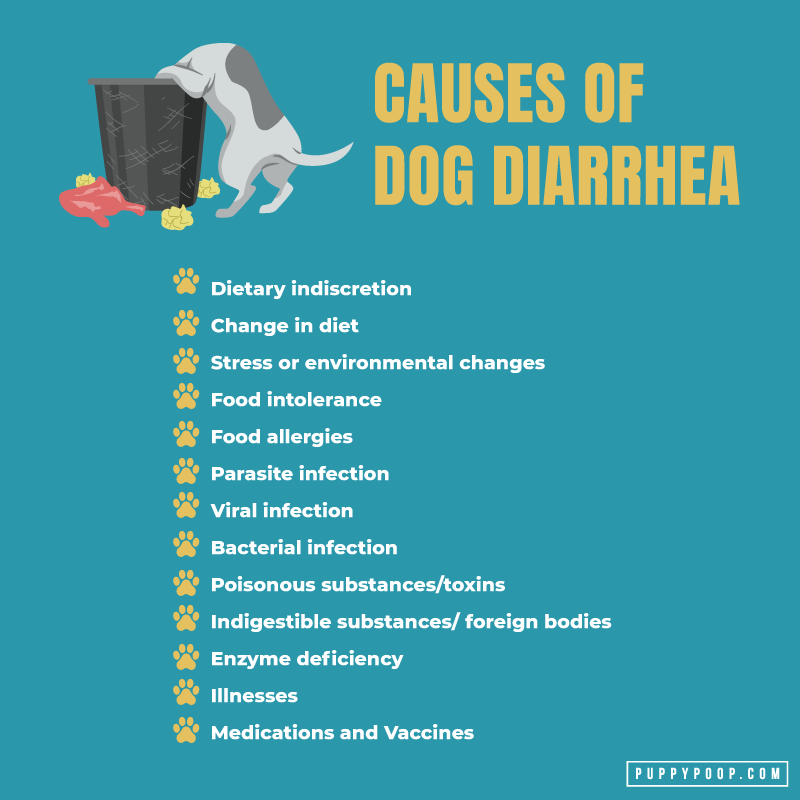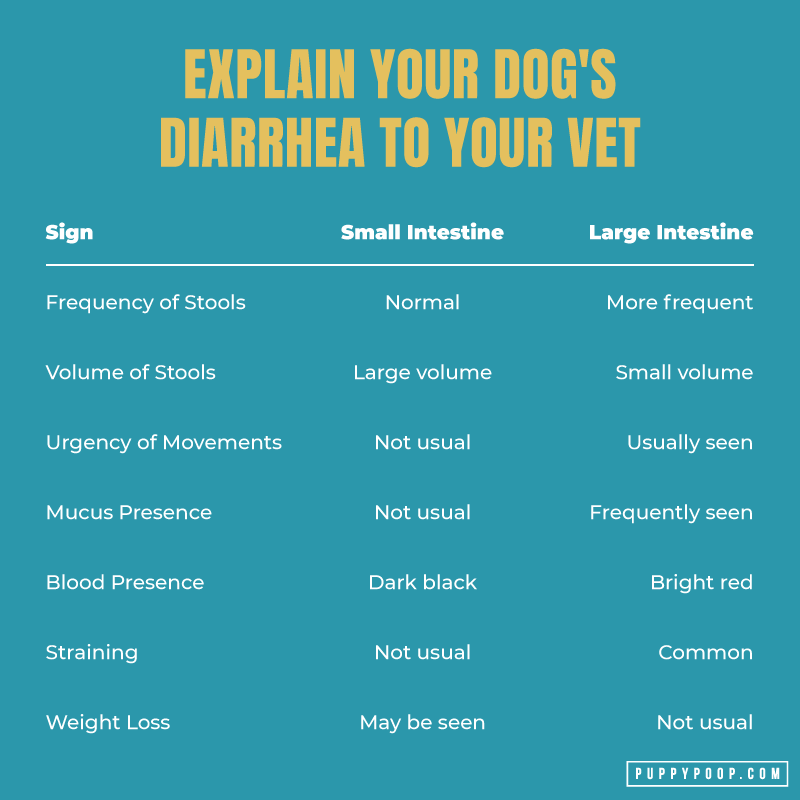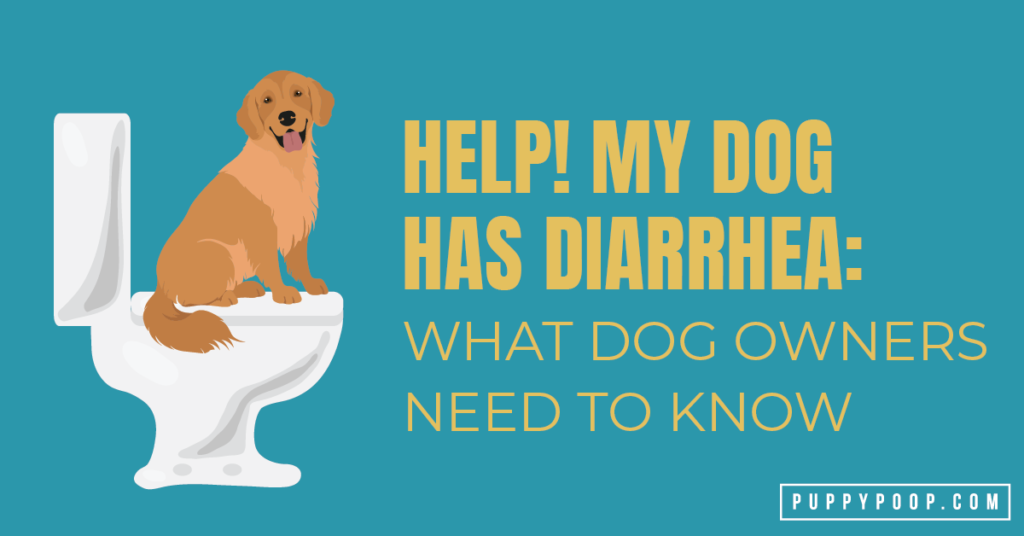This piece originally appeared on Dig Labs.
Every dog will have diarrhea at some point in their life. Diarrhea refers to passing very watery or soft stools and is one of the most common clinical signs presented to a veterinarian. It can occur for many simple reasons, such as a stressful event or giving too many treats. But there can also be more complex issues that can lead to diarrhea, like infections, foreign objects or certain illnesses.
Below is a list of the various causes of diarrhea in dogs:

| Dietary Indiscretion | Dogs may get an upset stomach from something they’ve recently eaten. This can be a new food or related to eating something they shouldn’t have, like garbage or spoiled food. |
| Change in Diet | Dogs need time to adapt to a new diet as any abrupt change in food or treats may lead to an upset stomach. |
| Stress or Environmental Changes | Dogs may get diarrhea after experiencing new environments or stressful situations. This includes vet visits, grooming or doggy boarding. Sometimes your dog may not be able to process certain ingredients in their diet. This can lead to discomfort and diarrhea. |
| Food Intolerance | Processed foods, grains and legumes may be associated with food intolerance. Some dogs may be allergic to certain types of proteins or other ingredients. This can lead them to have diarrhea and vomiting. |
| Food Allergies | Some dogs may also show signs of skin disease. In this case, they may scratch, lick at their belly or feet, or have chronic ear or skin infections. |
| Parasite Infection | Hookworm* commonly produces dark, tarry feces Whipworm commonly causes diarrhea with excess mucus and bright blood (frank blood) Giardia* can result in acute, chronic, or intermittent diarrhea. Coccidia |
| Viral Infection | Parvovirus: It is usually vaccinated against so it is often only seen in puppies. It leads to severe diarrhea and can be fatal. Coronavirus Rotavirus |
| Bacterial Infection | Salmonella*: can occur with eating raw eggs or inappropriately stored or spoiled foods Campylobacter*: can occur with eating raw chicken Clostridium perfringens |
| Poisonous Substance/ Toxins | Lead, persin (sources include avocado skin and pits) and certain household plants (azaleas and rhododendrons) can cause diarrhea in your pet. |
| Indigestible Substances/ Foreign Bodies | Socks, toys or other foreign objects may get stuck in your dog’s gut. This can cause a partial obstruction which can lead to diarrhea. |
| Enzyme Deficiency | Enzymes help your pet digest certain substances. Without certain enzymes, they may struggle to digest things. This can cause chronic weight loss and diarrhea. |
| Illnesses | Kidney or liver disease, inflammatory bowel disease and cancer may cause diarrhea. |
| Medicaitons and Vaccines | Certain antibiotics Non-steroidal anti-inflammatories (NSAIDs) and steroids. It is very important to give these medications with food to avoid any chance of stomach upset. Vaccine reactions |
*These infections can be transmitted to people, especially young children, the elderly or immune compromised individuals.
Signs Your Dog Has Diarrhea
As gross as it might be, being able to describe your dog’s stool in detail can help your veterinarian. Knowing the frequency, urgency and volume of the diarrhea can help point the vet to where the problem might be within the gastrointestinal tract. It is also important to look for signs of straining, mucus or the presence of blood. (The DIG Labs Digestive Health app was designed to help your veterinarian during episodes of dog diarrhea.)
Additionally, the color of the blood is also helpful. Bright red or frank blood occurs with large intestinal diarrhea. This is often seen when your dog strains to pass stool. Dark (tar-like) stool is a sign of digested blood. This can occur with small intestinal diarrhea or ulcers. If your dog has dark black stools, contact your veterinarian for further guidance.
The table below shows the differences between small and large intestinal diarrhea:

Stool color may also provide a bit more detail and help you determine what is causing your dog’s diarrhea
Important Information For Your Vet
Health concerns, especially when a dog has diarrhea, are frustrating. Preparation and information can allow your veterinarian to better help you and your dog. A few things your veterinarian will want to know include any photos of your dog’s stool along with potential thoughts on the cause of diarrhea. This includes any new treats they may have had or any recent human foods that they may not be familiar with. If your pet enjoys chewing on things they shouldn’t, like socks or toys, let your veterinarian know. Unfortunately, these are the usual culprits for partial obstructions in your dog’s gut that can lead to diarrhea. It will also be important to mention any medications and supplements your pet takes regularly or has recently started.
What You Can Expect at a Veterinarian Visit
Physical Exam
Your veterinarian will perform a thorough physical exam. They will check to see if your pet has lost any weight and if their body condition is adequate. To check their hydration level, they will look at your pet’s skin elasticity and gum texture and color. The vet will also gently feel your dog’s stomach to see if they are painful. By feeling their stomach, they can sometimes identify an obvious intestinal foreign body.
Rectal Exam
Your vet may also perform a rectal exam. They will look at stool consistency, any signs of blood and check for inflammation.
Fecal Tests
Fecal tests, general health blood work and abdominal radiographs may also be necessary, depending on your pet’s clinical signs. Learn more about different types of stool tests.
Further Tests
With more chronic cases of diarrhea, your veterinarian may suggest further tests. These can include blood work, abdominal radiographs, ultrasound and endoscopy. They may recommend diet changes or supplements for leaky gut and dysbiosis. Fecal matter transplants (FMTs) could also be considered in some cases. Biopsies of the intestines, either by endoscope or more invasive surgery, may be necessary. But this is usually if treatments have not worked, and a cause has not been found.
Potential Treatments for Adult Dogs
Conservative treatment may be enough if your pup is otherwise healthy and happy. This may include withholding food for a short period of time or providing small amounts of bland diet throughout the day. A digestible prescription canned food or a home-cooked diet of boiled meat and rice may be recommended. Withholding food or providing a bland diet allow your dog’s gut to rest and normalize. Water should always be available to ensure proper hydration. Once the stool becomes more normal, your dog can be slowly transitioned back to their regular diet. This is done by mixing increasing amounts of their regular diet with the bland diet over a few days. It is always important to slowly change your pet’s food to avoid gastrointestinal upset and diarrhea. Learn how you can treat your dog’s diarrhea at home. If your dog’s diarrhea persists despite conservative treatment or if they have other signs of feeling ill (low energy, low appetite, not drinking, vomiting, pale gum color), it is best to contact your veterinarian for help.
There are various medications that are often prescribed for diarrhea, but these depend on an individual dog’s clinical signs.
- Natural anti-diarrhea products like DiaGel can be given to your dog, especially in cases of diet-based diarrhea.
- Dewormers may be given to ensure your dog is free from parasites or if they have received a positive fecal test.
- Metronidazole, a commonly used antibiotic, is often prescribed for cases of diarrhea. This medication can work well in certain cases, but it may disrupt your dog’s normal gut bacteria. Read more about the effects of metronidazole and discuss with your vet if this is the best choice for your pup.
- Probiotics are often prescribed for diarrhea and can be given to maintain gut health.
Most cases of diarrhea usually resolve with the use of a bland diet or additional oral medications. Some cases of chronic diarrhea may need life-long treatment and special prescription diets. With severe diarrhea, dogs can experience dehydration and electrolyte imbalances. In these cases, hospitalization may be necessary to provide fluid therapy and more intensive treatment.
Get the DIG Labs App
Download the free DIG Labs Digestive Health Tracker to get personalized insights and recommendations for your dog based on their stool.

